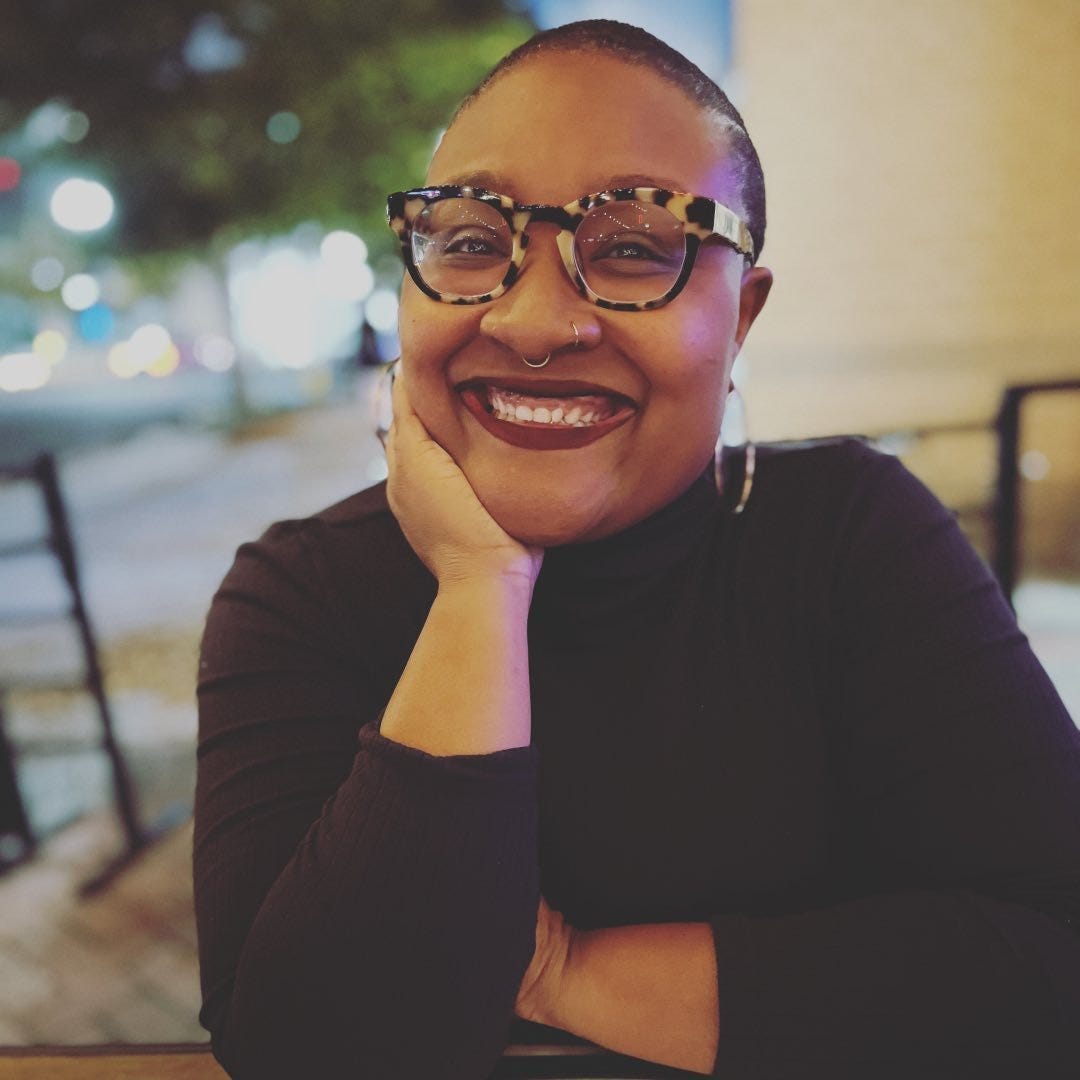The Postdoc Journey: A Space For Radical Reflection
A Guest Post from Dr. Briana Barner
![person's hand reaching on water with reflection ] person's hand reaching on water with reflection ]](https://images.unsplash.com/photo-1514668899050-f91140ee495b?crop=entropy&cs=tinysrgb&fit=max&fm=jpg&ixid=MnwzMDAzMzh8MHwxfHNlYXJjaHw0fHxyZWZsZWN0aW9ufGVufDB8fHx8MTY4MDE4NDUzOQ&ixlib=rb-4.0.3&q=80&w=1080)
I applied for a postdoc at the height of the pandemic, while recovering from giving birth and helping my then five-year-old navigate “Zoom school,” all while writing a dissertation. I was beyond exhausted. I was defeated and questioned whether pursuing an academic career during so much uncertainty made any sense at all. The postdoc ended up being exactly what I needed to recover, reflect, and grow.
My postdoc is rapidly coming to an end, and as I reflect on the experience, I’m so glad I made the decision to pursue this path. I wish all recent grads had the ability to do the same. It is important to acknowledge that not all postdocs are created equal or have the same expectations. For example, my particular position came with no teaching or service obligations. But I also recognize that, like me, many of you might have questions about the postdoc experience, especially a non-STEM based one. Before I started my postdoc, I had no idea what to expect and hadn’t met anyone else who had held this position. There were no postdocs in the department I graduated from.
After being in the grind mode of writing a dissertation, my postdoc provided time to reimagine my life within the academy. As a grad student, I often felt infantilized and beholden to the whims of my professors, who felt like they held my future in their hands. I also suffered from impostor syndrome, which heightened my anxiety and left me feeling depressed. When I started my grad program, I had no boundaries and would work around the clock, especially on the weekends. As time went on, I understood that this wasn’t sustainable, but I had no idea how to pivot from these unhealthy habits.

One of the things I invested in with my research funds were sessions with a productivity coach (Dr. Kate Henry), who helped me think about the wellness habits I wanted to cultivate in this new career, such as slow productivity. I discovered Kate’s The Tending Year blog when we were both doctoral students, and it was refreshing and markedly changed how I approached academia. I had known that the grind culture that seemed to be celebrated in academia was not sustainable or appealing to me, and finding Kate’s work affirmed this for me.
With the help of my productivity coach (and my therapist), I was able to reflect on what was at the root of these issues and think through new systems that I could adopt that aligned with the new lifestyle that I envisioned for myself. My productivity coach helped me to question my relationship to work and, most importantly, redefine what success looked like for me now that I was on the other side of accomplishing a major life goal.
One of the harder things I did during my postdoc was give myself the space to grieve and sit with the trauma that I had experienced throughout my grad program. I was able to truly process the last few years, now that I was away from everything that had exacerbated my anxiety and self-doubt. None of it was okay, and my feelings were valid. I also took time to rebuild my confidence in my abilities as a scholar, educator, and person. My degrees are not the sum of my identity, but it is important to congratulate ourselves for accomplishing major goals that we set.
My mentor pointed out that I seemed hesitant to dig deeper and be more explicit in my writing, which was one of the results of the trauma I experienced as a grad student. She challenged me to read more to help develop my own voice. Most importantly, she affirmed that my voice was necessary and important. Throughout my program, I questioned whether this was actually true. I allowed myself to work through these uncomfortable emotions, and I believe I have become a better person because of it.
This vulnerability led to fantastic realizations about how I wanted to structure my courses and the kind of educator I wanted to be. I also thought deeply about the boundaries I wanted to enforce in order to cultivate the scholarly and personal life that I wanted to have. It is important to me to not replicate some of the harmful practices I saw as a student. I want my students to see me taking breaks and encourage them to, in turn, do the same. I also want to encourage them to be confident in their unique voices and contributions by modeling this throughout our dialogues in class and the readings that I assign. The classroom is a space for radical transformation, and I want to embody this.

Since my postdoc came with no additional teaching or service obligations, I was able to really dive into my research and practice slow reading. I was also able to ask myself tough questions that I did not have the mental capacity to even consider broaching during my intense fight-or-flight response to finishing my grad program during a pandemic. I encourage other postdocs and junior scholars to consider these questions as well:
What kind of scholar do I want to be?
Writing a dissertation was one of the hardest things I’ve ever done, and it will probably only be read by a handful of people (literally, the five people on my committee). Now that I can widen my audience, I’ve spent more time thinking about my writing style, format, etc.
What authors am I in conversation with?
I wrote my dissertation for the appeal of my committee members and, specifically, my advisor. In other words, the dissertation had a specific purpose, but now that I’m done with it, I can place my work with the authors whose work more closely aligns with mine. And because I’ve been able to take my time and read more closely, new authors that I hadn’t considered are appearing in my orbit, which is exciting.
What kind of mentor do I want to be?
My current mentor is truly invested in mentoring students and models the kind of mentor I’d like to be. I’ve had amazing professors who have modeled compassionate and rigorous teaching, but I hadn’t really thought of myself as a mentor guiding future PhDs until after I graduated. I began thinking about the kind of advice I wish I would have received while I was a student, which included prioritizing compassion and a focus on well-being.
All of these realizations will continue long after my postdoc ends, but I will forever be grateful for the space to be still enough to reflect. This deep reflection is one that I want to prioritize as I transition into my tenure-track role this fall. I am proud of myself for cultivating this journey. I hope that other postdoc programs and graduate programs in general can prioritize something similar for other early-career scholars. This investment benefits not only the scholar but also their department, students, colleagues, and profession at large.
We Want to Hear From You!
How have you carved out space to reflect, heal, and grow? What realizations have you come to now that you are no longer a graduate student? How can we alter the structure of graduate school to make it less traumatic? You just might have the insight that someone else needs to hear today!
Comment on the newsletter post (not the email), and one commenter will be chosen at random to receive a complimentary one-year paid subscription to Publish Not Perish. You can use it for yourself or give it away!
Dr. Briana Barner is a President’s Postdoctoral Fellow in the Department of Communication at the University of Maryland. She received a doctorate in Radio-Television-Film and a doctoral portfolio in Women’s and Gender Studies from the University of Texas. Briana also earned a Master’s in Women’s and Gender Studies from UT. She is an interdisciplinary critical and cultural communications scholar with research interests in Black podcasts, digital and Black feminism, digital media, social media as a tool for social justice and activism and the representation of marginalized people, specifically Black girls and women, in popular culture and media.




I'd love a follow up post in about a year to see reflections on the first year as a tenure-track prof (congrats!) and to see if any of the thoughts on being a postdoc remain the same or different. I'm still pre-candidacy but posts like yours are helping me (hopefully!) have the confidence to know and demand/ask nicely for the things that will be beneficial for myself as the Dr. Scholar Mentor I want to be. Thank you so much!
Thank you for sharing your insights. And such a good point about taking time and space to reflect on what kind of academic one wants to be!